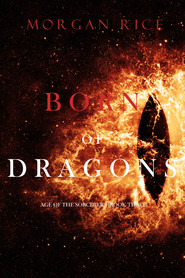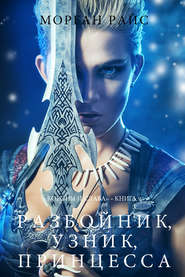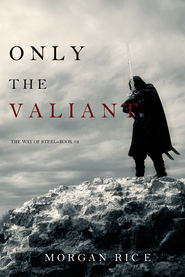По всем вопросам обращайтесь на: info@litportal.ru
(©) 2003-2024.
✖
Rise of the Valiant
Настройки чтения
Размер шрифта
Высота строк
Поля
Merk ran, the billowing clouds of smoke getting closer, making it harder to breathe, the smell of smoke stinging his nostrils, and a familiar feeling began to overtake him. It was not fear or even, after all these years, excitement. It was a feeling of familiarity. Of the killing machine he was about to become. It was always what happened when he went into battle – his own, private battle. In his version of battle, he killed his opponent face to face; he didn’t have to hide behind a visor or armor or a crowd’s applause like those fancy knights. In his view, his was the most courageous battle of all, reserved for true warriors like himself.
And yet as he ran, something felt different to Merk. Usually, Merk did not care who lived or died; it was just a job. That kept him clear to reason, free from being clouded emotionally. Yet this time, it was different. For the first time in as long as he could remember, no one was paying him to do this. He proceeded of his own volition, for no other reason than because he pitied the girl and wanted to set wrongs right. It made him invested, and he did not like the feeling. He regretted now that he had not acted sooner and had turned her away.
Merk ran at a steady clip, not carrying any weapons – and not needing to. He had in his belt only his dagger, and that was enough. Indeed, he might not even use it. He preferred to enter battle weaponless: it threw his opponents off-guard. Besides, he could always strip his enemy’s weapons and use them against them. That left him with an instant arsenal everywhere he went.
Merk burst out of Whitewood, the trees giving way to open plains and rolling hills, and was met by the huge, red sun, sitting low on the horizon. The valley spread out before him, the sky above it black, as if angry, filled with smoke, and there, aflame, sat what could only be the remnants of the girl’s farm. Merk could hear it from here, the gleeful shouts of men, criminals, their voices filled with delight, bloodlust. With his professional eye he scanned the scene of the crime and immediately spotted them, a dozen men, faces lit by the torches they held as they ran to and fro, setting everything aflame. Some ran from the stables to the house, setting torches to straw roofs, while others slaughtered the innocent cattle, hacking them down with axes. One of them, he saw, dragged a body by the hair across the muddy ground.
A woman.
Merk’s heart raced as he wondered if it was the girl – and if she were dead or alive. He was dragging her to what appeared to be the girl’s family, all of them tied to the barn by ropes. There were her father and mother, and beside them, likely her siblings, smaller, younger, both girls. As a breeze moved a cloud of black smoke, Merk caught a glimpse of the body’s long blonde hair, matted with dirt, and he knew that was her.
Merk felt a rush of adrenaline as he took off at a sprint down the hill. He rushed into the muddy compound, running amidst the flame and the smoke, and he could finally see what was happening: the girl’s family, against the wall, were all already dead, their throats cut, their bodies hanging limply against the wall. He felt a wave of relief as he saw the girl being dragged was still alive, resisting as they dragged her to join her family. He saw a thug awaiting her arrival with a dagger, and he knew she would be next. He had arrived too late to save her family – but not too late to save her.
Merk knew he had to catch these men off-guard. He slowed his gait and marched calmly down the center of the compound, as if he had all the time in the world, waiting for them to take notice of him, wanting to confuse them.
Soon enough, one of them did. The thug turned immediately, shocked at the sight of a man walking calmly through all the carnage, and he yelled to his friends.
Merk felt all the confused eyes on him as he proceeded, walking casually toward the girl. The thug dragging her looked over his shoulder, and at the sight of Merk he stopped, too, loosening his grip and letting her fall in the mud. He turned and approached Merk with the others, all closing in on him, ready to fight.
“What do we have here?” called out the man who appeared to be their leader. It was the one who had dropped the girl, and as he set his sights on Merk he drew a sword from his belt and approached, as the others encircled him.
Merk looked only at the girl, checking to make sure she was alive and unharmed. He was relieved to see her squirm in the mud, slowly collecting herself, lifting her head and looking back out at him, dazed and confused. Merk felt relief that he had not, at least, been too late to save her. Perhaps this was the first step on what would be a very long road to redemption. Perhaps, he realized, it did not start in the tower, but right here.
As the girl turned over in the mud, propping herself up on her elbows, their eyes met, and he saw them flood with hope.
“Kill them!” she shrieked.
Merk stayed calm, still walking casually toward her, as if not even noticing the men around him.
“So you know the girl,” the leader called out to him.
“Her uncle?” one of them called out mockingly.
“A long-lost brother?” laughed another.
“You coming to protect her, old man?” another mocked.
The others burst into laughter as they closed in.
While he did not show it, Merk was silently taking stock of all his opponents, summing them up out of the corner of his eye, tallying how many they were, how big they were, how fast they moved, the weapons they carried. He analyzed how much muscle they had versus fat, what they were wearing, how flexible they were in those clothes, how fast they could pivot in their boots. He noted the weapons they held – the crude knives, daggers drawn, swords poorly sharpened – and he analyzed how they held them, at their sides or out in front, and in which hands.
Most were amateur, he realized, and none of them truly concerned him. Save one. The one with the crossbow. Merk made a mental note to kill him first.
Merk entered a different zone, a different mode of thinking, of being, the one that always naturally gripped him whenever he was in a confrontation. He became submerged in his own world, a world he had little control over, a world he gave his body up to. It was a world that dictated to him how many men he could kill how quickly, how efficiently. How to inflict the maximum damage with the least possible effort.
He felt bad for these men; they had no idea what they were walking into.
“Hey, I’m talking to you!” their leader called out, hardly ten feet away, holding out his sword with a sneer and closing in fast.
Merk stayed the course, though, and kept marching, calm and expressionless. He was staying focused, hardly listening to their leader’s words, now muted in his mind. He would not run, or show any signs of aggression, until it suited him, and he could sense how puzzled these men were by his lack of actions.
“Hey, do you know you’re about to die?” the leader insisted. “You listening to me?”
Merk continued walking calmly while their leader, infuriated, waited no longer. He shouted in rage, raised his sword, and charged, swinging down for Merk’s shoulder.
Merk took his time, not reacting. He walked calmly toward his attacker, waiting until the very last second, making sure not to tense up, to show any signs of resistance.
He waited until his opponent’s sword reached its highest point, high above the man’s head, the pivotal moment of vulnerability for any man, he had learned long ago. And then, faster than his foe could possibly foresee, Merk lunged forward like a snake, using two fingers to strike at a pressure point beneath the man’s armpit.
His attacker, eyes bulging in pain and surprise, immediately dropped the sword.
Merk stepped in close, looped one arm around the man’s arm and tightened his grip in a lock. In the same motion he grabbed the man by the back of his head and spun him around, using him as a shield. For it wasn’t this man that Merk had been worried about, but the attacker behind him with the crossbow. Merk had chosen to attack this oaf first merely to gain himself a shield.
Merk spun and faced the man with the crossbow, who, as he’d anticipated, already had his bow trained on him. A moment later Merk heard the telltale sound of an arrow being released from the crossbow, and he watched it flying through the air right for him. Merk held his writhing human shield tight.
There came a gasp, and Merk felt the oaf flinch in his arms. The leader cried out in pain, and Merk suddenly felt a jolt of pain himself, like a knife entering his own stomach. At first he was confused – and then he realized the arrow had gone through the shield’s stomach, and the head of it had just barely entered Merk’s stomach, too. It only penetrated perhaps a half inch – not enough to seriously wound him – but enough to hurt like hell.
Calculating the time it would take to reload the crossbow, Merk dropped the leader’s limp body, grabbed the sword from his hand, and threw it. It sailed end over end toward the thug with the crossbow and the man shrieked, eyes widening in shock, as the sword pierced his chest. He dropped his bow and fell limply beside it.
Merk turned and looked over at the other thugs, all clearly in shock, two of their best men dead, all now seeming unsure. They faced each other in the awkward silence.
“Who are you?” one finally called out, nervousness in his voice.
Merk smiled wide and cracked his knuckles, relishing the bout to come.
“I,” he replied, “am what keeps you up at night.”
Chapter Five
Duncan rode with his army, the sound of hundreds of horses thundering in his ears as he led them south, throughout the night, away from Argos. His trusted commanders rode beside him, Anvin on one side and Arthfael on the other, only Vidar remaining home to guard Volis, while several hundred men lined up beside them, all riding together. Unlike other warlords, Duncan liked to ride side-by-side with his men; he did not consider these men to be his subjects, but rather his brothers-in-arms.
They rode through the night, the cool wind in their hair, the snow beneath their feet, and it felt good to be on the move, to be heading for battle, to no longer be cowering behind the walls of Volis as Duncan had for half his life. Duncan looked over and spotted his sons Brandon and Braxton riding alongside his men, and while he was proud to have them with him, he did not worry for them as he did for his daughter. Despite himself, as hour followed hour, even though he told himself he would not worry, Duncan found his nighttime thoughts turning to Kyra.
He wondered where she was now. He thought of her crossing Escalon alone, with only Dierdre, Andor, and Leo to join her, and his heart tugged at him. He knew the journey he had sent her on was one that could imperil even some hardened warriors. If she survived it, she would return a greater warrior than any of the men who rode with him here today. If she did not, he would never be able to live with himself. But desperate times called for desperate measures, and he needed her to complete her quest more than ever.
They crested a hill and descended another, and as the wind picked up, Duncan looked out at the rolling plains, spread out before him beneath the moonlight, and he thought of their destination: Esephus. The stronghold of the sea, the city built on the harbor, the crossroads of the northeast and the first major port for all shipping. It was a city bordered by the Sea of Tears on one side and a harbor on the other, and it was said whoever controlled Esephus controlled the better half of Escalon. The next closest fort to Argos and a vital stronghold, Esephus had to be his first stop, Duncan knew, if he were to have any chance of rallying a revolution. The once-great city would have to be liberated. Its harbor, once so proudly filled with ships waving the banners of Escalon, was now, Duncan knew, filled with Pandesian ships, a humbled reminder of what it once was.
Duncan and Seavig, the warlord of Esephus, had been close once. They had ridden into battle together as brothers-in-arms countless times, and Duncan had sailed out to sea with him more than once. But since the invasion, they had lost touch. Seavig, a once-proud warlord, was now a humbled soldier, unable to sail the seas, unable to rule his city or visit other strongholds, like all warlords. They might as well have detained him and labeled him what he truly was: a prisoner, like all other warlords of Escalon.
Duncan rode through the night, the hills lit only by the torches of his men, hundreds of sparks of light heading south. As they rode, more snow fell and the wind raged, and the torches struggled to stay alight as the moon fought to break through the clouds. Yet Duncan’s army pushed on, gaining ground, these men who would ride anywhere on earth for him. It was unconventional, Duncan knew, to attack at night, much less in the snow – yet Duncan had always been an unconventional warrior. It was what had allowed him to rise through the ranks, to become the old king’s commander, was what had led to his having a stronghold of his own. And it was what made him one of the most respected of all dispersed warlords. Duncan never did what other men did. There was a motto he tried to live by: do what other men expected least.
The Pandesians would never expect an attack, since word of Duncan’s revolt could not have spread this far south so soon – not if Duncan reached them in time. And they would certainly never expect an attack at nighttime, much less in the snow. They would know the risks of riding at night, of horses breaking legs, and of a myriad other problems. Wars, Duncan knew, were often won more by surprise and speed than by force.
Duncan planned to ride all night long until they reached Esephus, to try to conquer the vast Pandesian force and take back this great city with his few hundred men. And if they took Esephus, then maybe, just maybe, he could gain momentum and begin the war to take back all of Escalon.
“Down below!” Anvin called out, pointing into the snow.
Duncan looked down at the valley below and spotted, amidst the snow and fog, several small villages dotting the countryside. Those villages, Duncan knew, were inhabited by brave warriors, loyal to Escalon. Each would have but a handful of men, but it could add up. He could gain momentum and bolster his army’s ranks.

















